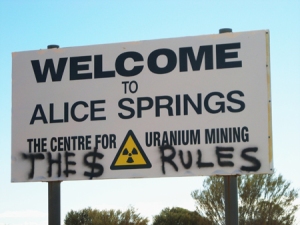By Daryl G. Kimball
Australia has for many years been a leader in establishing more robust barriers against nuclear proliferation, including its key role in the negotiation of the 1996 Comprehensive Test Ban Treaty and negotiation of the 1985 South Pacific Nuclear Weapons Free Zone Treaty (SPNFZ).
Article 4 of the SPNFZ bars nuclear trade by members of the zone with states that do not accept comprehensive or "full-scope" safeguards on their nuclear facilities. The standard was established in order to prevent the use of nuclear technology and material supplied by SPNFZ states to be used for nuclear weapons purposes.
 Today in Sydney, however, at the urging of Prime Minister Julia Gillard, the Australian Labor Party narrowly voted 206-185 to reverse it longstanding policy against the sale of uranium to India and other states that are not members of the nuclear Nonproliferation Treaty and do not allow full-scope safeguards.
Today in Sydney, however, at the urging of Prime Minister Julia Gillard, the Australian Labor Party narrowly voted 206-185 to reverse it longstanding policy against the sale of uranium to India and other states that are not members of the nuclear Nonproliferation Treaty and do not allow full-scope safeguards.
Uranium sales to India would clearly be illegal under a strict interpretation of the South Pacific Nuclear Weapons Free Zone Treaty until and unless India agrees to international inspections of all of its nuclear sites. This is not the case today, as India only allows limited inspections over certain civilian nuclear plants and keeps its nuclear weapons research and production facilities off limits.
As a legal brief commissioned by the International Campaign Against Nuclear Weapons explains, official records show that former Australian Foreign Minister Alexander Downer told the Australian Parliament unambiguously in 1996 that the South Pacific Nuclear Free Zone Treaty bans Australian uranium exports to non-NPT states like India that do not allow full-scope safeguards.
This is not the first time Australia's political leaders have flirted with the idea. The Howard government floated the idea in 2007 and ACA spoke out against it.
It was a bad idea then. Its a bad idea now.
Not only would it be illegal for Australia to sell uranium to India but it would undermine a range of other measures that are important for maintaining future stability and security in Asia.
India remains outside the global nonproliferation mainstream—one of only three countries not to have signed the Nuclear Non-Proliferation Treaty (NPT). Unlike the five original nuclear weapons states--the United States, Russia, the U.K., France, and China-- India has continues to produce fissile material for nuclear weapons and it has refused to sign the Comprehensive Nuclear Test Ban Treaty.
Australian uranium sales to India could allow India to amass enough uranium for its energy production reactors to free up its limited domestic supply of uranium to help accelerate its ability to produce fissile material for weapons. This alarms Pakistan and has helped stimulate more fissile material production in that volatile country.
Rather than look the other way, Australia should urge India (and Pakistan) to halt the production of fissile material for weapons, as both India and Pakistan have more than enough nuclear firepower to blow the other away and to deter one another or any other state from attacking them with nuclear weapons.
A decision to sell uranium without condition to India would also undermine Australia's ability to help persuade New Delhi's to sign the Comprehensive Test Ban Treaty, which cannot enter into force without India's approval. Australian leaders have in the past argued that India's voluntary moratorium on weapons testing cannot be a substitute a legally binding test ban and that it is time for India and other CTBT hold out states to finally act.
Ms. Gillard should take notice of the fact that current U.S. laws would require the United States to terminate nuclear trade with India if it resumes testing. As then-Sen. Obama (D-Ill.) said on the floor of the Senate on November 16, 2006, "[I]n the event of a future nuclear test by the Government of India, nuclear power reactor fuel and equipment sales, and nuclear technology cooperation would terminate."
Prime Minister Julia Gillard and Australia can do better.
Rather than violate its international obligations against nuclear trade with states that do not allow full-scope safeguards and ignore India's non-participation in global nonproliferation treaties and standards, Australia's leaders should refrain from selling uranium to India until it exercises greater nuclear weapons restraint and meets the same nonproliferation standards expected of other nuclear-armed countries.
